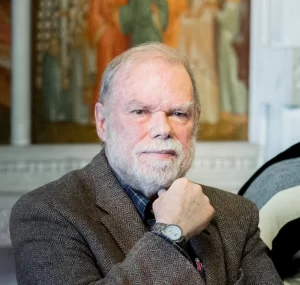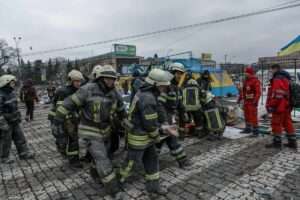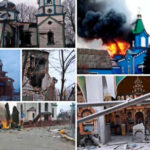Practical Assistance in Conflict Areas
By Sheri San Chirico
While taking a fresh look at the Orthodox Peace Fellowship website, I was reminded of the OPFs three principal work areas: theological research, publications, and practical assistance in conflict areas. The first two are addressed by In Communion
, our website, our e-mail discussion list, and by our conferences.
While I still have high hopes for the growth of OPF in these areas, I believe the most potential we have for growth is in the area of practical assistance in conflict areas. This is the most difficult aspect of peacemaking -- it is, as they say, where the rubber hits the road.
 To provide practical assistance in conflict areas first requires vigilance regarding conflict in order to know when and where it arises, and the time and energy to understand the history and nuances behind the conflict. Then time and money must be given in order to travel to where the conflict is. Finally, practical assistance demands the commitment and courage to enter into the realm of the conflict, to open ones self up to the dangers involved. For practical assistance to be useful, a clear vision of how to help overcome the conflict is needed -- facilitation, negotiation, or simply a peaceful presence which refuses to allow aggression or violence to continue unchallenged.
To provide practical assistance in conflict areas first requires vigilance regarding conflict in order to know when and where it arises, and the time and energy to understand the history and nuances behind the conflict. Then time and money must be given in order to travel to where the conflict is. Finally, practical assistance demands the commitment and courage to enter into the realm of the conflict, to open ones self up to the dangers involved. For practical assistance to be useful, a clear vision of how to help overcome the conflict is needed -- facilitation, negotiation, or simply a peaceful presence which refuses to allow aggression or violence to continue unchallenged.
How can a small fellowship like ours, scattered as it is throughout the world, reach the maturity necessary for this significant aspect of its work? Im not sure, but I think its time we begin learning how.
As a first step, I suggest we commit ourselves to training leaders within OPF who will not only draw on their own experience of peacemaking but who will learn a core curriculum that is uniquely OPFs. The training will include learning from other peace groups that have accumulated years of experience in conflict areas and have a track record of constructive impact. The process will also require integrating what we learn from these groups with our Orthodox faith, nourished by the Liturgy, drawing on our rich tradition of peacemaking, self sacrifice, solidarity with the poor and oppressed, and of speaking out by our actions and words in places of violence and conflict. And finally, the training will strive to further in each peacemaker the resources needed in order to stand in the place of conflict as an ambassador of Christs peace. My hope is that, step by step, as we become more capable, OPF peacemaker teams will go to the places of conflict, especially within the Orthodox world, to be a presence of peace and assistance.
The groundwork is now laid for a first step. The first OPF training session will begin this May at Matthew 25 House of Hospitality in Akron, Ohio. Might you take part? Those who make themselves available will forge the way and begin the trek toward expertise in peacemaking.
Saint Gregory of Nyssa, writing on The Lords Prayer and the Beatitudes, provides an apt description of the peacemaker in his commentary on Blessed are the peacemakers, for they shall be called children of God:
Peacemakers are those who imitate the Divine love of others, who show forth in their own life the characteristic of the Divine energy. The Lord and Giver of good things completely annihilates anything that is without affinity and foreign to goodness. This work He ordains also for you, namely to cast out hatred and abolish war, to exterminate envy and banish strife, to take away hypocrisy and extinguish from within resentment of injuries smoldering in the heart. Instead, you ought to introduce whatever is contrary to the things that have been removed. For as light follows the departure of darkness, thus also these evil things are replaced by the fruits of the Spirit: by charity, joy, peace, benignity, magnanimity, all the good things enumerated by the Apostle (Gal 5:22). How then should the dispenser of the Divine gifts not be blessed, since he imitates the gifts of God and models his own good deeds on the Divine generosity?
But perhaps the beatitude does not only regard the good of others. I think that man is called a peacemaker par excellence who pacifies perfectly the discord between flesh and spirit in himself and the war that is inherent in nature, so that the law of the body no longer wars against the law of the mind but is subjected to the higher rule and becomes a servant of the Divine ordinance.
[Ancient Christian Writers series, Newman Press]
This is our challenge. If you are willing and able to take part in this first training, please contact me ([email protected]) and I will communicate with you regarding the particulars.
Sheri San Chirico is North American coordinator of the Orthodox Peace Fellowship. She received her Master of Divinity from Princeton Theological Seminary, has worked with the Greek Orthodox Archdiocese Department of Religious Education and as a hospice chaplain. She lives in Santa Barbara with her husband Kerry and daughter Lucy.








